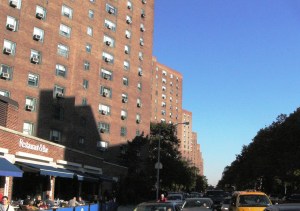Schumer Weighs In on Stuy Town Mess, Targeting Fannie, Freddie
By Eliot Brown January 26, 2010 8:10 pm
reprints With Stuyvesant Town headed to creditors, Senator Schumer has joined the pile-on on Fannie Mae and Freddie Mac.
With Stuyvesant Town headed to creditors, Senator Schumer has joined the pile-on on Fannie Mae and Freddie Mac.
Mr. Schumer put out a statement Tuesday calling on Fannie Mae and Freddie Mac to ensure that the 11,200-unit property is sold with long-term guarantees of affordability.
“At the end of the day we have to put the needs of thousands of middle-class residents and the need for New York City to maintain middle-class housing first,” Mr. Schumer said in a statement. “They were caught up in a high stakes real estate gamble that ended up going bust. Now Fannie and Freddie must guide this process to a conclusion with the least amount of impact on current tenants and families. I am going to watch them like a hawk to make sure they do just that.”
Fannie and Freddie hold a considerable chunk of the $3 billion senior mortgage on the deal (local Councilman Dan Garodnick said he believes they hold more than $2 billion).
Targeting the two publicly chartered organizations has been the strategy of tenants and local residents for months now, with the hope that the organizations will be unusually receptive to public pressure given that they were bailed out by the public in 2008. (Here’s a feature story from earlier this month on future steps at Stuy Town.)
In November, Mr. Garodnick and other local electeds—without the weight of Mr. Schumer—wrote letters to Fannie and Freddie trying to pressure them to work to keep the complex affordable.
The response they received was that both Fannie and Freddie hold the senior-most tranches of bonds, meaning they would be the first to be paid back in any sale. (A spokeswoman for Freddie Mac previously also said Freddie’s holdings were credit enhanced, a form of insurance.) By contract, decisions on such issues as management and sales are typically made by bond holders with far more risky holdings, and thus Fannie and Freddie say they do not have a seat at the table.
And even if the two companies were in a clear position to make decisions over affordability, it’s not clear they would want to do anything but fight to receive the maximum return on their investment. They are, after all, criticized on the one hand for their financial troubles and the need for public money to prop them up.
For the affordability advocates, the model was a housing complex in the Bronx, Ocelot, the loan for which was owned by Fannie Mae. With the property in default, tenant advocates and Mr. Schumer wanted long-term affordability, and thus targeted Fannie with press conferences and other public pressure. Torn between its desire to be more financially stable and the public pressure over affordability, Fannie ultimately sold the loan to Omni New York, an affordable housing group led by Mo Vaughn.
This, of course, was a far simpler situation, where only one party (Fannie) was involved, and the size of the loan was relative crumbs ($29 million). At Stuy Town, there are far more creditors with more legal rights to make decisions on the property, and the stakes are far greater.
In the end, there will likely be a push for another tenant-led plan to buy the complex, as there was in 2006. At the time, tenants pulled together capital to pay more than $4 billion for the complex, with a plan to convert rental apartments to co-ops. Tenants have once again said they are looking to mount a bid.



